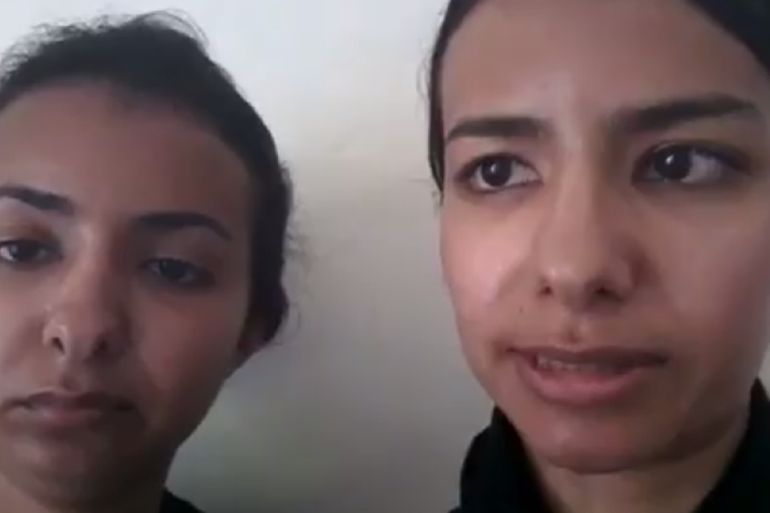Saudi sisters who fled to Turkey fear forced return
Lawyer says sisters, aged 28 and 30, were subjected to torture and abuse by family members before they fled to Istanbul.

Two sisters from Saudi Arabia, who are currently in Turkey, are desperately trying to avoid being returned to the kingdom, where they could be imprisoned, their lawyer has told Al Jazeera.
Serdarhan Topo said that his clients, 30-year-old Ashwaq Hamoud and 28-year-old Areej Hamoud, also fear violence from family members if they are forced to go back home.
Keep reading
list of 4 itemsUS sanctions two RSF commanders as fighting escalates in Sudan’s Darfur
The Lost Souls of Syria – Part 1
Is the US shipping weapons to Israel tacit support for its war on Gaza?
The sisters, who are Saudi nationals, say they were subjected to torture and abuse at the hands of relatives.
They tried to flee to New Zealand on February 8 from Hong Kong, where they had arrived from Saudi Arabia via undocumented methods.
“However, they were not allowed to board on the plane during a Hong Kong transit on the suspicion that they might seek asylum in their final destination,” Topo said.
In Saudi Arabia, where men are legal guardians of the family, women fleeing home is considered a crime.
The sisters face possible criminal charges in Saudi Arabia, which could lead to them being returned to their allegedly abusive guardians or being jailed for filial “disobedience” or “harming the reputation” of their country, because of their appeal for help outside the kingdom.
Disappointed following their attempt to go to New Zealand, the siblings travelled from Hong Kong to Istanbul.
Saudi nationals can enter Turkey by purchasing visas on arrival.
After staying and working in Istanbul, they applied for a residence permit in Turkey, which unexpectedly led to their detention in May.
“The father of the family, who is apparently an influential man, demanded his daughters return in a complaint through Saudi authorities, claiming that his daughters intended to go to Syria to join terrorist groups there,” said Topo.
“Shortly after their detention, the authorities decided to deport the sisters despite the fact that there was no evidence backing these claims.
“We were shocked to hear [about] this decision as these people [face possible] death, not to mention violence, if they are returned to their country.”
However, the Turkish Constitutional Court has ruled that any deportation process would not take place until the judicial process was completed.
A local court in Istanbul is reviewing the case.
Social media videos
After they were detained, several videos of the women – apparently filmed by themselves – were shared on social media.
The sisters speak of their fears; in one clip they claim that if they return to Saudi Arabia, they “will be killed” by their family or “put into prison forever”.
Social media users have shown their solidarity with the women with a hashtag, #SaveAshwaqAndAreej.
Topo says the accusation that the two sisters will join armed groups in Syria has influenced the case in a negative manner.
Turkish laws are currently highly sensitive to “terror” issues due to the country’s ongoing state of emergency.
“However, there is no arrest warrant for [the sisters] or case against them over this particular claim, which means that Turkish authorities are well aware that these are unfounded,” he said.
Ashwaq & Areej Alharbi apply for asylum in Turkey (video) They ask for your support to prevent their extradition from Turkey to Saudi Arabia pic.twitter.com/fO4jQ7wOWN
— Taleb Al Abdulmohsen (@DrTalebJawad) May 16, 2017
A state of emergency has been in effect in Turkey since a July 2016 failed military coup. The government has been implementing tough measures in cases they believe are related to “terrorism” since.
According to Turkish law, foreigners should not be returned to a place where “he or she may be subjected to torture, inhuman or degrading punishment or treatment”.
The two sisters are safe and in good health, Topo said, adding that their location is being kept secret due to security concerns.
Earlier in December, Sarah Leah Whitson, Middle East director at Human Rights Watch, said: “Saudi women fleeing their family or the country can face so-called honour violence or other serious harm if returned against their will.
“If Turkey returns these women, the consequences could be dire.”
The case of the Hamoud sisters is the latest example of Saudi women trying to flee their country.
Many before them have attempted to remain in countries where they travelled for tourism and education.
In April, 24-year-old Dina Ali Lasloom was sent back to Saudi Arabia against her will while in transit in the Philippines.
Lasloom, whose whereabouts in Saudi Arabia currently are unclear, was reportedly trying to fly to Australia to claim asylum there.
Al Jazeera has contacted Saudi Arabia’s embassy in Ankara for comment but did not receive a response by the time of publication.
Follow Umut Uras on Twitter: @Um_Uras